Filter by
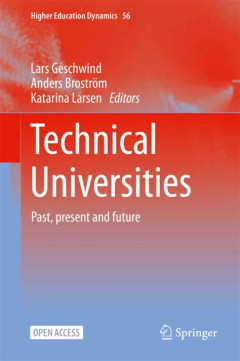
Technical Universities
This open-access volume critically examines the evolution and future of technical universities as independent, single-faculty institutions. Tracing their origins from polytechnical schools established during the industrial era, the book explores how these institutions have adapted to shifts in national higher education structures, academic disciplines, and governance models.
- Edition
- Volume 56
- ISBN/ISSN
- 978-3-030-50555-4
- Collation
- 245 page
- Series Title
- -
- Call Number
- 378.4
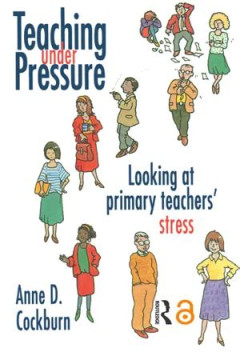
Teaching Under Pressure: Looking at primary teachers' stress
This text is based on the author's research into primary school teachers’ stress. The research has been linked with the author's belief in the need to understand ourselves, our personal and professional situations and how they relate. The resulting book is a practical text designed to address the reader in such a way that they can readily identify with what is being discussed. Furthermore, re…
- Edition
- -
- ISBN/ISSN
- 9780750705042
- Collation
- 169 Hal
- Series Title
- -
- Call Number
- 371.10019

Jurnal Lingkar Mutu Pendidikan
urnal Lingkar Mutu Pendidikan merupakan wadah publikasi ilmiah yang memuat hasil-hasil penelitian, kajian konseptual, dan praktik terbaik di bidang pendidikan.
- Edition
- Volume 8
- ISBN/ISSN
- 1979-3820
- Collation
- 29 cm x 21 cm
- Series Title
- Volume 8
- Call Number
- 370.5
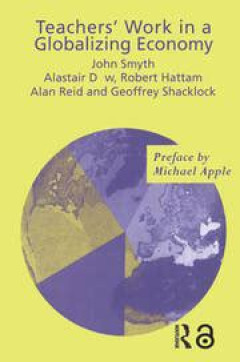
Teachers' Work in a Globalizing Economy
Extended critical case studies provide a tangible working expression of the labour process of teaching, showing how teachers are simultaneously experiencing significant changes to their work, as well as responding in ways that actively shape these processes. For teachers and researchers, this book reveals which processes in the global economy impact and sometimes control the role of the teacher.
- Edition
- -
- ISBN/ISSN
- 978-0-7507-0962-0
- Collation
- 224 Hal
- Series Title
- -
- Call Number
- 370.1
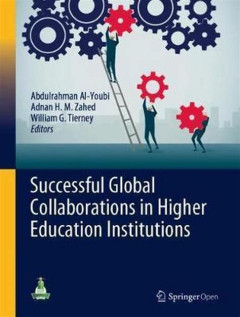
Successful Global Collaborations in Higher Education Institutions
This open access book presents a deep investigation into the manifold topics pertaining to global university collaboration. It outlines the strategies King Abdulaziz University has employed to rise in global rankings, and the reasons chosen to collaborate with other academic and research institutes.
- Edition
- -
- ISBN/ISSN
- 978-3-030-25525-1
- Collation
- 101 Hal
- Series Title
- -
- Call Number
- 378
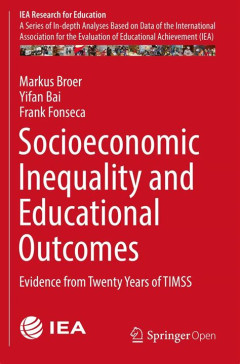
Socioeconomic Inequality and Educational Outcomes
This book explores how socioeconomic inequality affects educational outcomes, using two decades of data from the Trends in International Mathematics and Science Study (TIMSS). It examines patterns across countries and over time, analyzing the relationship between students’ socioeconomic status and their academic performance. The authors provide evidence that educational inequality is persiste…
- Edition
- Volume 5
- ISBN/ISSN
- 978-3-030-11991-1
- Collation
- 91 page
- Series Title
- -
- Call Number
- 379.2

Adminitrasi Pendidikan (Jurnal)
Buku Administrasi Pendidikan membahas secara komprehensif prinsip, konsep, dan praktik dalam pengelolaan lembaga pendidikan.
- Edition
- Volume XIV No 1
- ISBN/ISSN
- 1412-8158
- Collation
- 29 cm x 21 cm
- Series Title
- Jurnal Volume XIV No 1
- Call Number
- 371.2
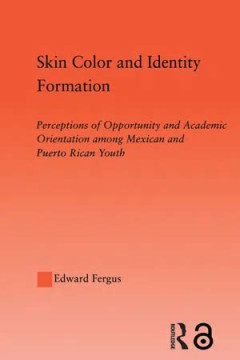
SKIN COLOR AND IDENTITY FORMATION
This study focuses on how skin color influences perceptions of opportunities and academic orientation among 17 Mexican and Puerto Rican high school students. Specifically, it analyzes how students modify—or maintain—their racial/ethnic identification in response to others’ perceptions based on skin tone.
- Edition
- -
- ISBN/ISSN
- 978-0-415-65171-4
- Collation
- 206 Hal
- Series Title
- -
- Call Number
- 373.1829
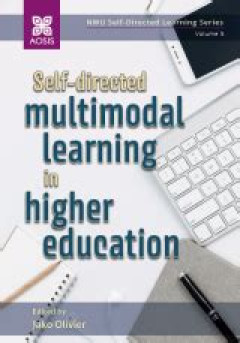
Self-directed in higher education multimodal learning
This book explores how students in higher education can take charge of their own learning using multiple modes—such as text, video, and digital tools. It highlights strategies that promote self-directed learning and examines how multimodal approaches enhance student engagement, autonomy, and academic success
- Edition
- volume 5
- ISBN/ISSN
- 978-1-928523-42-0
- Collation
- 470 Hal
- Series Title
- -
- Call Number
- 371.33
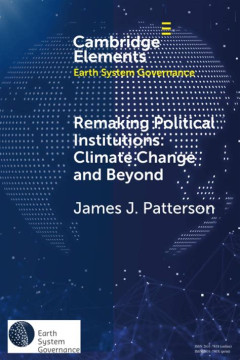
Remaking Political Institutions: Climate Change and Beyond
This Element develops an original analytical foundation for studying institutional remaking and its political dynamics. It explains how institutional remaking can be observed and provides a typology comprising five areas of institutional production involved in institutional remaking: novelty, uptake, dismantling, stability, and interplay.
- Edition
- -
- ISBN/ISSN
- 9781108708425
- Collation
- 98 Hal
- Series Title
- -
- Call Number
- 352.29
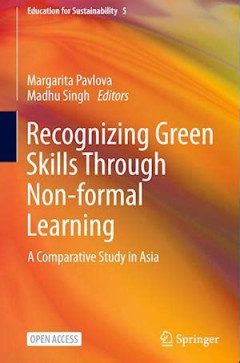
Recognizing Green Skills Through Non-formal Learning
Recognizing Green Skills Through Non-formal Learning discusses how environmentally relevant skills can be developed and validated outside formal education. It emphasizes the role of community programs and informal training in supporting sustainable development and green employment
- Edition
- -
- ISBN/ISSN
- 978-981-19-2072-1
- Collation
- 287 Hal
- Series Title
- -
- Call Number
- 374.26

Protecting the Rights of People with Autism in the Fields of Education and Em…
Fundamental rights to education and employment are essential pathways for the social inclusion of people with autism. This book begins with an overview of international and European legal frameworks that protect these rights—most notably the UN Convention on the Rights of Persons with Disabilities (Articles 24 & 27)—and then offers a detailed examination of domestic legislation, case law,…
- Edition
- -
- ISBN/ISSN
- 978-3-319-13791-9
- Collation
- 202 Hal
- Series Title
- -
- Call Number
- 344.0798

PROBLEMS AND PROSPECTS OF TRAINING IN HIGHER SCHOOL: PEDAGOGICAL, PHILOLO…
The collective monograph is devoted to consideration of the problems and prospects of student training in higher education, namely its pedagogical, philological, psychological and intercultural aspects. The main task of higher education today is personal development, formation of professional and social-communicative competence of students.
- Edition
- -
- ISBN/ISSN
- 978-617-7319-94-7
- Collation
- 156 Hal
- Series Title
- -
- Call Number
- 378.0
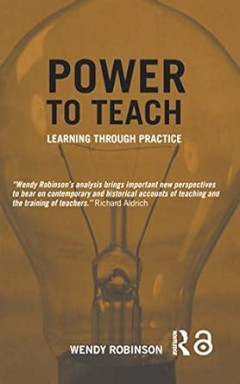
POWER TO TEACH Learning through Practice
: Learning Through Practice by Wendy Robinson highlights the importance of real teaching experience in developing effective and reflective educators. It argues that teaching is not just about content delivery but also about building professional identity and understanding the social context of learning. The book is a valuable resource for education students and teacher trainers.
- Edition
- -
- ISBN/ISSN
- 978-0-7130-0227-0
- Collation
- 169 Hal
- Series Title
- -
- Call Number
- 371.1

Mempelajari Alasan Guru : Memahami Motivasi Di Antara Guru Filipina (Jurnal)
Buku Mempelajari Alasan Guru: Memahami Motivasi di Antara Guru menyelami faktor-faktor yang memengaruhi motivasi mengajar guru di berbagai jenjang pendidikan.
- Edition
- -
- ISBN/ISSN
- -
- Collation
- 29 cm x 20 cm
- Series Title
- Jurnal
- Call Number
- 370.15

Postdigital Participation in Education
This book examines how participation in education is evolving in the postdigital era—where digital technologies are deeply embedded in everyday life. It explores how learners, educators, and institutions navigate new forms of engagement, collaboration, and knowledge production beyond traditional digital divides.
- Edition
- -
- ISBN/ISSN
- 978-3-031-38052-5
- Collation
- 265 Hal
- Series Title
- -
- Call Number
- 371.344

Jurnal Ilmiah Widyaiswara Indonesia (JIWI)
Jurnal Ilmiah Widyaiswara Indonesia (JWI) merupakan wadah publikasi karya ilmiah para widyaiswara di seluruh Indonesia. Jurnal ini menampilkan penelitian dengan fokus
- Edition
- Volume 1 No 1
- ISBN/ISSN
- 2962-9551
- Collation
- 25 cm x 18 cm
- Series Title
- Jurnal Ilmiah Widyaiswara Indonesia
- Call Number
- 370.72
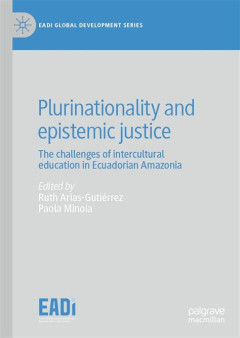
Plurinationality and epistemic justice
This book explores the challenges of implementing intercultural education in the Ecuadorian Amazon. It examines how plurinationality and epistemic justice are addressed in schools, highlighting tensions between Indigenous knowledge systems and formal education practices. The book calls for more inclusive, culturally respectful educational approaches.
- Edition
- -
- ISBN/ISSN
- 978-3-031-58860-0
- Collation
- 222 Hal
- Series Title
- -
- Call Number
- 370.152
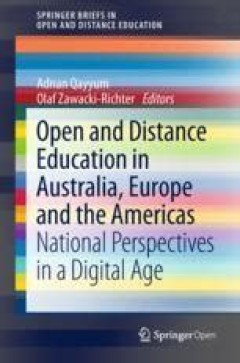
Open and Distance Education in Australia, Europe and the Americas
This open-access volume presents comparative snapshots of open and distance education across six national higher education systems—Australia, Brazil, Canada, Germany, the United Kingdom, and the United States . It traces the historical development, institutional structures, and evolving policies shaping ODE in each country, highlighting how digital transformation has influenced access, pedago…
- Edition
- -
- ISBN/ISSN
- 978-981-13-0298-5
- Collation
- 131 page
- Series Title
- -
- Call Number
- 371.3

New Teachers in Nordic Countries – Ecologies of Mentoring and Induction
This book explores how newly qualified teachers in Nordic countries are supported through mentoring and induction. It examines the diverse practices and policies across Denmark, Finland, Iceland, Norway, and Sweden, focusing on the ecological conditions that shape teacher support systems.
- Edition
- -
- ISBN/ISSN
- 978-82-02-69240-7
- Collation
- 203 Hal
- Series Title
- -
- Call Number
- 371.1
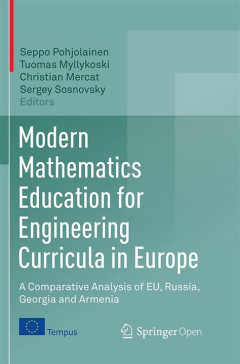
Modern Mathematics Education for Engineering Curricula in Europe
This book compares how mathematics is taught to engineering students across Europe, Russia, Georgia, and Armenia. It highlights two main teaching traditions, analyzes curriculum reforms, and promotes more practical, technology-supported learning methods in higher education.
- Edition
- -
- ISBN/ISSN
- 978-3-319-71416-5
- Collation
- 199 Hal
- Series Title
- -
- Call Number
- 370

Kependudukan
Modul ini membahas konsep kependudukan, termasuk struktur, distribusi, dan dinamika penduduk. Materi mencakup faktor-faktor yang mempengaruhi pertumbuhan penduduk, migrasi, serta dampak kependudukan terhadap pembangunan sosial dan ekonomi. Modul ini bertujuan memberikan pemahaman tentang pentingnya pengelolaan penduduk yang efektif untuk mendukung kesejahteraan dan pembangunan berkelanjutan.
- Edition
- -
- ISBN/ISSN
- -
- Collation
- 30cm X 21cm
- Series Title
- Modul
- Call Number
- 304.6 KEP

Lingkungan Hidup
Modul ini membahas konsep dasar lingkungan hidup, termasuk komponen biotik dan abiotik serta interaksi di antara keduanya. Materi mencakup berbagai permasalahan lingkungan seperti pencemaran, kerusakan habitat, dan perubahan iklim, serta upaya pelestarian dan konservasi sumber daya alam. Modul ini bertujuan meningkatkan kesadaran peserta didik tentang pentingnya menjaga keseimbangan ekosistem d…
- Edition
- -
- ISBN/ISSN
- -
- Collation
- 30cm X 21cm
- Series Title
- Modul
- Call Number
- 363.7 LIN

Hubungan Timbal - Balik Antara Manusia dan Lingkungan
Modul ini membahas hubungan saling mempengaruhi antara manusia dan lingkungan hidupnya. Materi mencakup bagaimana aktivitas manusia memengaruhi kondisi lingkungan, serta bagaimana lingkungan memengaruhi kehidupan sosial, ekonomi, dan budaya manusia. Modul ini juga mengulas konsep keberlanjutan dan pentingnya sikap tanggung jawab dalam menjaga keseimbangan ekosistem. Dengan pendekatan interdisip…
- Edition
- -
- ISBN/ISSN
- -
- Collation
- 30cm X 21cm
- Series Title
- Modul
- Call Number
- 304 HUB

Energi
Modul ini membahas konsep dasar energi, jenis-jenis energi, serta peranannya dalam kehidupan sehari-hari dan pembangunan berkelanjutan. Materi mencakup energi kinetik, potensial, panas, listrik, serta sumber energi terbarukan dan tidak terbarukan. Selain itu, dijelaskan pula proses perubahan bentuk energi, efisiensi penggunaan energi, serta dampak lingkungan dari pemanfaatan energi. Modul ini d…
- Edition
- -
- ISBN/ISSN
- -
- Collation
- 30cm X 21cm
- Series Title
- Modul
- Call Number
- 333.79 ENE

Life Skills Education for Youth
Life Skills Education for Youth explores the essential competencies that young people need to thrive in an increasingly complex and fast-changing world. The book focuses on practical skills such as critical thinking, decision-making, communication, emotional regulation, and interpersonal relationships. Designed for educators, youth workers, and policy makers, it offers both theoretical foundati…
- Edition
- -
- ISBN/ISSN
- 978-3-030-85214-6
- Collation
- 283 Hal
- Series Title
- -
- Call Number
- 370

International Scientific Conference on Digitalization, Innovations & Sustaina…
This volume presents the proceedings of the International Scientific Conference on Digitalization, Innovations, and Sustainable Development, held in 2023. The conference brought together academics, practitioners, and industry experts to explore the dynamic interrelation between digital technologies, innovative strategies, and sustainable development goals.
- Edition
- -
- ISBN/ISSN
- 978-3-7258-1921-8
- Collation
- 96 Hal
- Series Title
- -
- Call Number
- 338.9

International Comparisons in Learning and Education
This book explores how different countries approach learning and education, offering comparative insights into policies, practices, and outcomes. It analyzes international data and case studies to highlight similarities and differences across educational systems
- Edition
- -
- ISBN/ISSN
- 978-3-031-60958-9
- Collation
- 291 Hal
- Series Title
- -
- Call Number
- 370.9
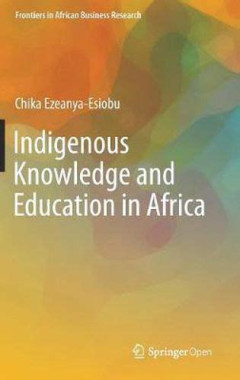
Indigenous Knowledge and Education in Africa
This open access book presents a strong philosophical, theoretical and practical argument for the mainstreaming of indigenous knowledge in curricula development, and in teaching and learning across the African continent.
- Edition
- -
- ISBN/ISSN
- 978-981-13-6635-2
- Collation
- 120 Hal
- Series Title
- -
- Call Number
- 338
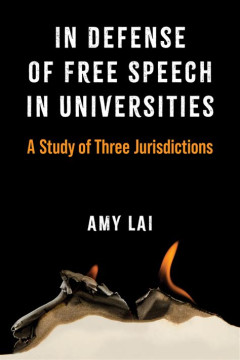
In Defense of Free Speech in Universities
In this book, Amy Lai examines the current free speech crisis in Western universities. She studies the origin, history, and importance of freedom of speech in the university setting, and addresses the relevance and pitfalls of political correctness and microaggressions on campuses, where laws on harassment, discrimination, and hate speech are already in place, along with other concepts that hav…
- Edition
- -
- ISBN/ISSN
- 9780472903795
- Collation
- 308 Hal
- Series Title
- -
- Call Number
- 341
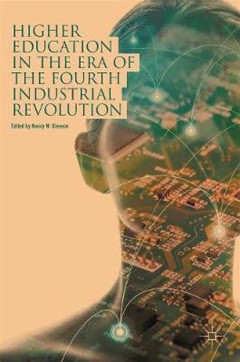
HIGHER EDUCATION IN THE ERA OF THE FOURTH INDUSTRIAL REVOLUTION
This open access collection examines how higher education responds to the demands of the automation economy and the fourth industrial revolution. Considering significant trends in how people are learning, coupled with the ways in which different higher education institutions and education stakeholders are implementing adaptations, it looks at new programs and technological advances that are cha…
- Edition
- -
- ISBN/ISSN
- 978-981-13-0194-0
- Collation
- 238 Hal
- Series Title
- -
- Call Number
- 378

Perusakan Lapisan Ozon
Modul ini membahas perusakan lapisan ozon sebagai salah satu isu lingkungan global yang berdampak luas terhadap kehidupan di Bumi. Materi mencakup pengertian lapisan ozon, fungsi utamanya dalam melindungi makhluk hidup dari radiasi ultraviolet, penyebab utama kerusakannya seperti penggunaan CFC dan bahan kimia berbahaya lainnya, serta dampaknya bagi kesehatan dan lingkungan. Selain itu, modul i…
- Edition
- -
- ISBN/ISSN
- -
- Collation
- 30cm X 21cm
- Series Title
- Modul
- Call Number
- 363.73874 PER

Global Citizenship Education
The book explores how global citizenship education (GCE) prepares students to engage with global issues like human rights, sustainability, and diversity. It examines both theory and practice, highlighting how GCE can empower learners to think critically and act responsibly in a globalized world.
- Edition
- -
- ISBN/ISSN
- 978-3-030-44617-8
- Collation
- 217 Hal
- Series Title
- -
- Call Number
- 323.6

First-in-Family Students, University Experience and Family Life
This book explores the experiences of students who are the first in their family to attend university. It examines their motivations, challenges, and the impact of higher education on family relationships.
- Edition
- -
- ISBN/ISSN
- 978-3-031-34451-0
- Collation
- 307 Hal
- Series Title
- -
- Call Number
- 378.198
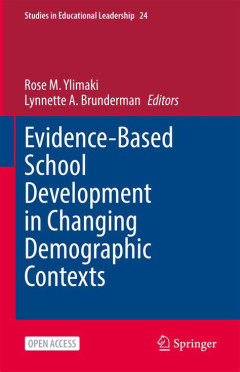
Evidence-Based School Development in Changing Demographic Contexts
This book explores how schools can use data-driven strategies to adapt and improve in response to changing demographic trends. It highlights practical approaches for inclusive, evidence-based development in diverse educational settings.
- Edition
- -
- ISBN/ISSN
- 978-3-030-76837-9
- Collation
- 185 Hal
- Series Title
- -
- Call Number
- 371.2
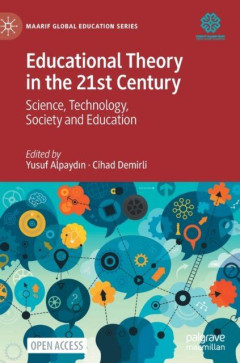
Educational Theory in the 21st Century
This open-access volume examines how scientific, technological, and social transformations of the twenty-first century are reshaping educational theory. The first section explores philosophical and technological foundations; the second analyzes shifts in conceptions of humanity and society and their implications for educational paradigms; and the final section addresses practical dimensions—s…
- Edition
- -
- ISBN/ISSN
- 978-981-16-9640-4
- Collation
- 269 page
- Series Title
- -
- Call Number
- 370.1
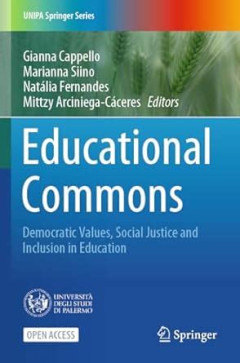
Educational Commons
This open access book presents the final findings from the case studies developed within the Horizon 2020 SMOOTH project “Educational Spaces: Passing through Enclosures and Reversing Inequalities through Educational Commons.
- Edition
- -
- ISBN/ISSN
- 978-3-031-51837-9
- Collation
- 258 Hal
- Series Title
- -
- Call Number
- 379.2
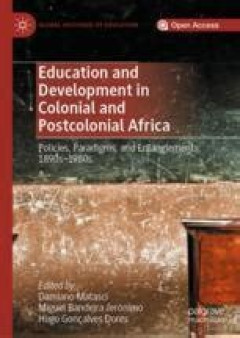
Education and Development in Colonial and Postcolonial Africa
This open-access edited volume analyzes the intertwined histories of education and development in 20th-century Africa. Covering the late 19th century to the 1980s, it examines how diverse actors—colonial governments, international organizations, religious groups, and local communities—shaped educational paradigms and development agendas. Through case studies from both colonial and postcolon…
- Edition
- -
- ISBN/ISSN
- 978-3-030-27801-4
- Collation
- 331 page
- Series Title
- -
- Call Number
- 379
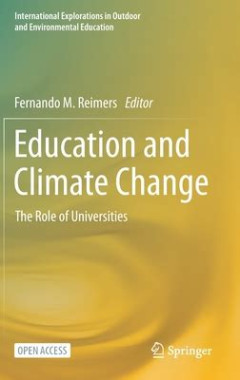
Education and Climate Change
This open-access volume examines how universities can lead climate change education through partnerships with schools and communities. It reviews gaps in current efforts and presents case studies—from the Middle East to Guatemala, Haiti to Pakistan—demonstrating a five‑step process for designing context-specific curricula that foster deep learning and social action
- Edition
- -
- ISBN/ISSN
- 978-3-030-57927-2
- Collation
- 213 Hal
- Series Title
- -
- Call Number
- 333.7071
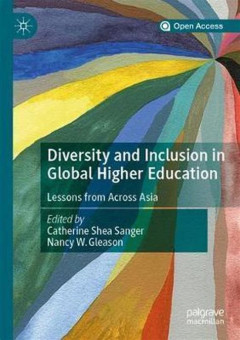
Diversity and Inclusion in Global Higher Education
Diversity and Inclusion in Global Higher Education: Lessons from Across Asia is an open-access volume that offers pioneering insights and practical methods for promoting diversity and inclusion in higher education classrooms and curricula. It highlights the growing importance of international education programs in Asia and the value of understanding student diversity in a changing, evermore int…
- Edition
- -
- ISBN/ISSN
- 978-981-15-1628-3
- Collation
- 309 page
- Series Title
- -
- Call Number
- 323.6
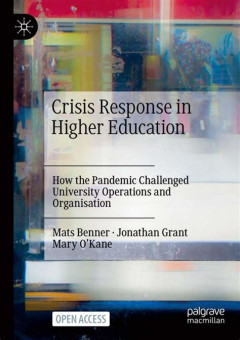
Crisis Response in Higher Education
This book explores how higher education institutions responded to the COVID-19 crisis, with a particular focus on governance, operations, teaching, and organization. Drawing on case studies from multiple countries, the volume examines the immediate and long-term institutional responses to the pandemic and their implications for the future of higher education. It considers how universities manag…
- Edition
- -
- ISBN/ISSN
- 978-3-030-97837-2
- Collation
- 187 Hal
- Series Title
- -
- Call Number
- 378
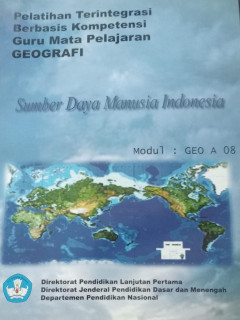
Sumber Daya Manusia Indonesia
Modul ini membahas potensi, karakteristik, serta tantangan pengelolaan Sumber Daya Manusia (SDM) di Indonesia dalam mendukung pembangunan nasional. Materi mencakup aspek kuantitas dan kualitas penduduk usia produktif, persebaran tenaga kerja, pendidikan dan keterampilan, serta strategi pengembangan SDM yang berdaya saing. Dengan pendekatan analitis dan kontekstual, modul ini bertujuan membekali…
- Edition
- -
- ISBN/ISSN
- -
- Collation
- 28cm x 21cm
- Series Title
- Modul
- Call Number
- 331.11 AGU

Communicating in School Science
This book investigates how students aged 5 to 16 communicate and collaborate during science lessons. It emphasizes the importance of group work, dialogue, and peer interaction in developing scientific understanding
- Edition
- -
- ISBN/ISSN
- 9781850006435
- Collation
- 195 Hal
- Series Title
- -
- Call Number
- 375.5
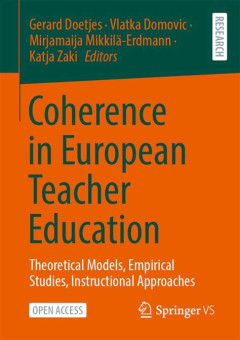
Coherence in European Teacher Education
This open-access volume compiles research on coherence in teacher education from a transnational European perspective. Through theoretical-conceptual, empirical, and instructional lenses, the contributions investigate structural, curricular, conceptual, and personnel dimensions of coherence in teacher education
- Edition
- -
- ISBN/ISSN
- 978-3-658-43721-3
- Collation
- 271 Hal
- Series Title
- -
- Call Number
- 370
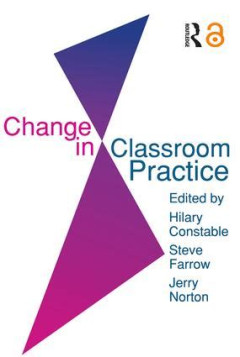
Change in Classroom Practice
Change in Classroom Practice explores how and why classroom practices change, focusing on the challenges faced by teachers attempting to implement educational reform. Drawing on case studies and real classroom experiences, the book examines the dynamics between policy demands, teacher beliefs, and institutional cultures. The authors analyze the tension between innovation and resistance, and how…
- Edition
- -
- ISBN/ISSN
- : 978‑0750701983
- Collation
- 167 Hal
- Series Title
- -
- Call Number
- 371.1024
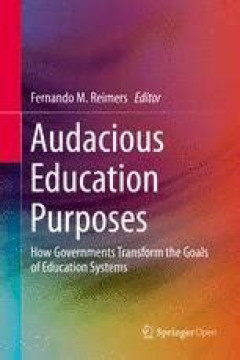
Audacious Education Purposes
This book examines how eight countries—Brazil, Finland, Japan, Mexico, Peru, Poland, Portugal, and Russia—have redefined the goals of their education systems to respond to 21st-century challenges. It investigates how governments develop “audacious” education purposes aimed at promoting inclusion, sustainability, democratic participation, and economic adaptability.
- Edition
- -
- ISBN/ISSN
- 978-3-030-41882-3
- Collation
- 256 page
- Series Title
- -
- Call Number
- 370

Konsep Pendidikan Lingkungan Hidup Pada Sekolah Menengah Kejuruan
Modul ini membahas konsep dasar Pendidikan Lingkungan Hidup (PLH) yang dirancang khusus untuk diterapkan di Sekolah Menengah Kejuruan (SMK). Materi mencakup pentingnya kesadaran lingkungan, prinsip pembangunan berkelanjutan, serta integrasi nilai-nilai kepedulian lingkungan dalam kegiatan pembelajaran vokasional. Modul ini bertujuan untuk menumbuhkan sikap tanggung jawab siswa SMK terhadap pele…
- Edition
- -
- ISBN/ISSN
- -
- Collation
- -
- Series Title
- Modul
- Call Number
- 373.246 PEN

Education for the Professions in Times of Change
This book is a critical exploration of the place of professions and professionals across a range of fields, from p olicing to m idwifery, s ocial w ork to j ournalism, and the fi ctional pr ofessionals of literature. It arose from a concern about the denigration of professionals by populist politicians which in itself demonstrated the need for the kinds of trustworthy expertise for which prof…
- Edition
- -
- ISBN/ISSN
- 978-3-03936-516-6
- Collation
- 188 halaman
- Series Title
- education science
- Call Number
- 371.3

Inclusive Pedagogy in Contemporary Education
In recent years, education has undergone significant transformation, largely driven by a growing acknowledgment of the importance of inclusive pedagogy. This book, Inclusive Pedagogy in Contemporary Education, explores the multifaceted aspects of inclusive teaching and learning practices. It provides educators with a comprehensive exploration of strategies, insights, and reflections essential f…
- Edition
- Volume 15
- ISBN/ISSN
- 978-0-85014-065-1
- Collation
- 266 halaman
- Series Title
- Education and Human Development
- Call Number
- 371.9046

Contemporary Pedagogies in Teacher Education and Development
As with most dynamic activities that are based on social and cultural contexts and rely on interactions, education is a complex and often ambiguous endeavor. Despite this complexity, however, scholars and educators are often required to find ways of defining and explaining what “good” teaching is and to incorporate these conclusions into teacher education. What are the characteristics of �…
- Edition
- -
- ISBN/ISSN
- 978-1-83881-638-4
- Collation
- 148 halaman
- Series Title
- -
- Call Number
- 370.71
 Computer Science, Information & General Works
Computer Science, Information & General Works  Philosophy & Psychology
Philosophy & Psychology  Religion
Religion  Social Sciences
Social Sciences  Language
Language  Pure Science
Pure Science  Applied Sciences
Applied Sciences  Art & Recreation
Art & Recreation  Literature
Literature  History & Geography
History & Geography